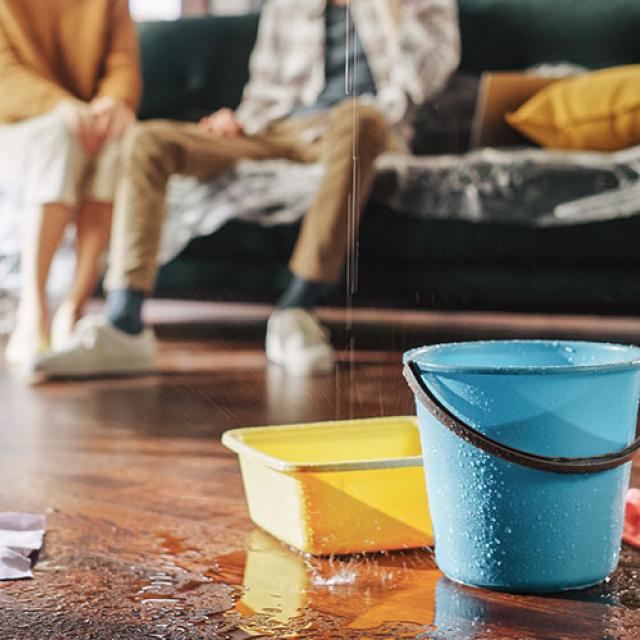Water damage: Don’t plumb the depths of despair!

Like fire, water can do a lot of damage to your home and personal belongings. In both cases, the damage can often be avoided through proper prevention.
But what about when your plumbing is the villain? A leaky or burst pipe can be a huge hassle. Luckily there are things you can do to avoid trouble. To help you get started, we’ve drawn up a list of the main types of damage plumbing can cause, with helpful tips on how to steer clear.
Your pipes
Water escaping from a leaky pipe flows quickly and can cause a lot of damage. Anything that absorbs the humidity can sprout spores and mould. Which means that even small, hidden leaks can be a big problem. So be on the lookout. Knowing where your pipes are and keeping an eye on them can really save the day!
Your washing machine
The rubber hoses on washing machines are the cause of many a claim. Why? Because they’re not made to last 15 or 20 years. Keep these few preventive measures in mind:
- Make a habit of closing your stop valves whenever you leave the house for a few days.
- Inspect your hoses at least once a year.
- Change your hoses after ten years of use at most—even if they seem to be in good shape—or as soon as you see signs of deterioration (corrosion, hairline cracks, swelling, etc.). On many hoses, you’ll see “Replace after 5 years,” so keep an eye out for that and replace them accordingly.
- Ideally, you should use braided stainless steel hoses, which are much stronger and more durable.
- Always use CSA B125.6 certified hoses. Hoses that aren’t CSA B125.6 certified aren’t strong enough to be used with a washing machine.
Your dishwasher
Your dishwasher is handy and helpful and you want it to stay that way! That’s why you need to keep tabs on the hot water intake and drainage pipe. They tend to develop those small leaks we discussed earlier, which spell mould. Don’t forget to check the door gasket or seal. All it requires is a regular cleaning to make sure all that water stays on the inside.
Your water heater
Claims involving water heaters are serious business. That’s why insurers only cover this type of risk if the water heater is replaced in the eleventh year after installation, or before if it shows signs of deterioration. And while you’re having that new heater installed, have a drain pan set into the floor underneath and connect it to a drain pipe.
Your main water valve
If, despite your best efforts, your plumbing springs a leak, head immediately to your main water valve and shut it off. Of course, to have that reflex, you need to know where it is and how to close it—and so does everyone else in the household. This is the single most important tip we can give you: Make sure everyone in the house knows where the main water valve is and how to shut it off quickly if need be.
And in spring, your gutters and window wells!
Hey, it’s spring! That means it’s time to clean your gutters and get all those leaves, buds, and other debris out. That way your gutters can collect water from your roof and channel it away from the house, where it won’t cause water damage. Do the same thing with your window wells to keep water from seeping through your basement windows.
We hope you’ll use these helpful tips to keep your house safe from the water damage that plumbing, gutters, and window wells can cause. Remember, we’re always there to insure your home and ensure your peace of mind, with prevention experts who are happy to share their knowledge and experience. Don’t hesitate to ask for a quote for your home insurance. Insured members with a water leak detection system get 10% off!



